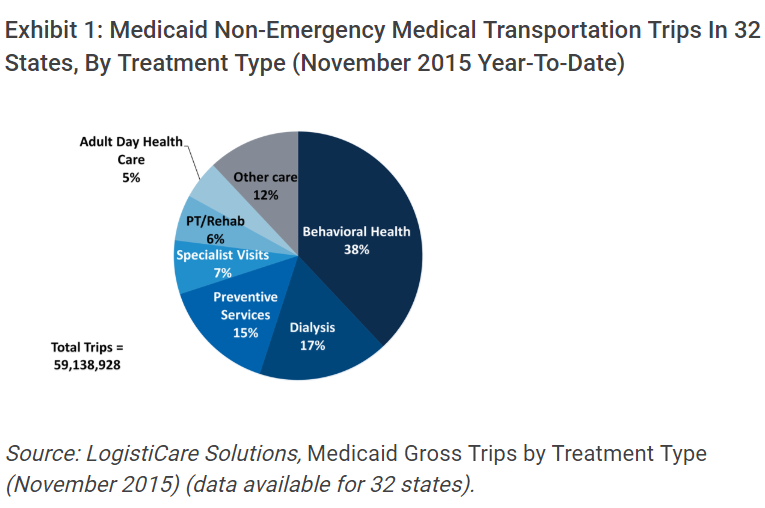
Budget Proposal Would Allow States To Drop Medicaid Transportation Benefits Across The Entire Program
06.12.2018
Budget Proposal Would Allow States To Drop Medicaid Transportation Benefits Across The Entire Program

Without Precedent
The need for transportation among Medicaid enrollees is so widespread that ending Medicaid’s broad “assurance of transportation” would undercut the program’s ability to fulfill its objective of providing health care to enrollees. Ending that assurance would also be entirely without precedent.
To be sure, CMS, during the time that one of us (Fishman) oversaw the benefit, has approved “waivers” or exceptions from benefit requirements allowing state Medicaid programs to eliminate NEMT for limited populations and almost always for populations to whom a state is newly expanding Medicaid coverage. Federally approved elimination of the transportation benefit has always been limited to one of three circumstances:
- Waivers that provided limited benefit packages to otherwise non-Medicaid-eligible people more broadly, most of which were limited to family planning benefits.
- Waivers allowing states to test novel program elements for the Affordable Care Act (ACA) new adult coverage group such as incentivizing use of preventive services and denying coverage for several months if these beneficiaries failed to pay premiums.
- CMS allowed three states to limit NEMT in the early stages of state plan amendments to implement the then-new Medicaid “benchmark” benefit plans in 2007–09.
None of the past CMS approvals of NEMT limits—neither pre- nor post-ACA—is a precedent for broadly allowing states to drop or limit NEMT for all Medicaid populations. The potential new Trump administration rules under which NEMT becomes optional would allow states to drop the benefit for the aged, blind, persons with disabilities, and children entitled to the early and periodic screening, diagnostic, and treatment.
The NEMT benefit is not only essential for a large number of Medicaid enrollees, it is fiscally prudent. Drawing on research by the Transportation Research Board of the National Academies, the Stephen Group said in a report prepared for the Arkansas Health Reform Task Force that if access to NEMT services saved only one hospitalization in 100 trips, the return on investment (ROI) would be 10 to 1. A study conducted by Florida State University found NEMT’s ROI factor to be 11 to 1. Indeed, a growing number of Medicare Advantage plans are offering medical transportation as a business decision despite the lack of Medicare reimbursement for NEMT.
As described in a 1974 District Court opinion affirming a lower court ruling that Texas must provide NEMT to its Medicaid patients, “untreated, the minor medical problem becomes the major medical problem and…the individual…becomes…sick enough to qualify as an emergency case to be transported by ambulance and to be admitted as a hospital in-patient. It is the worst kind of false economy.”
The administration should abandon plans to make NEMT an optional benefit.




